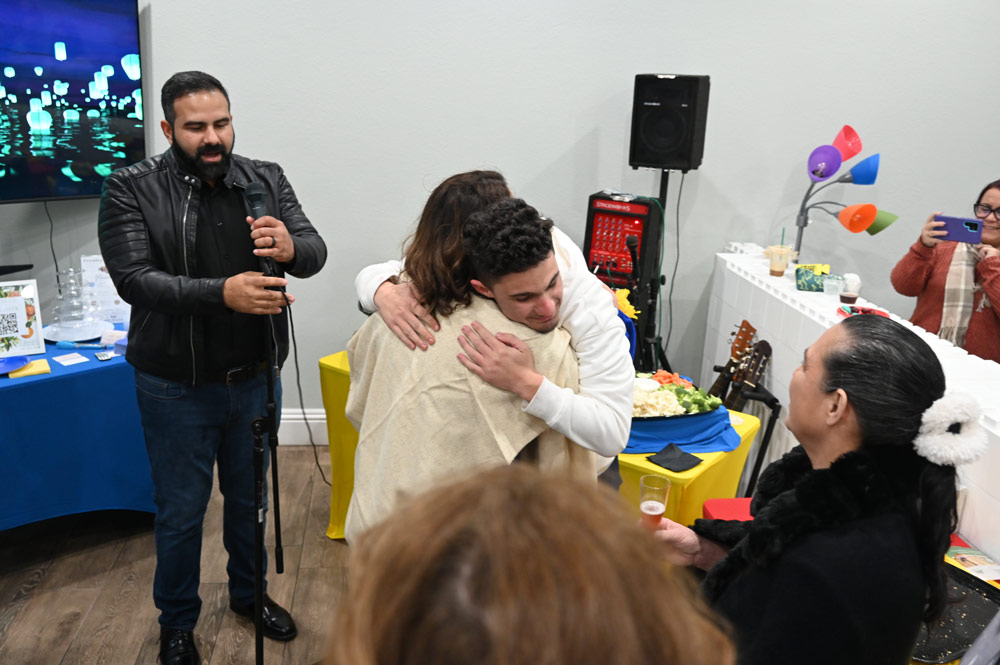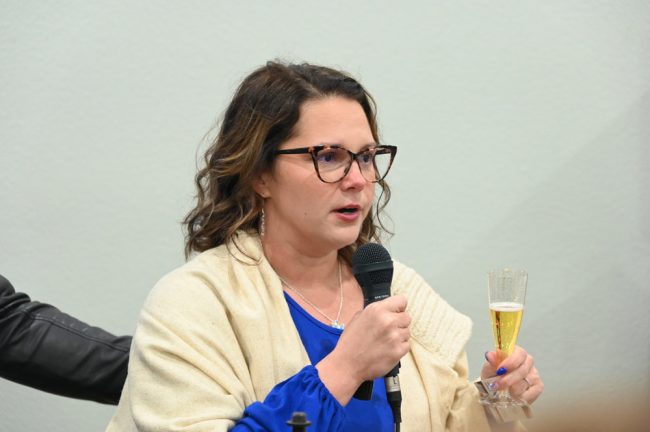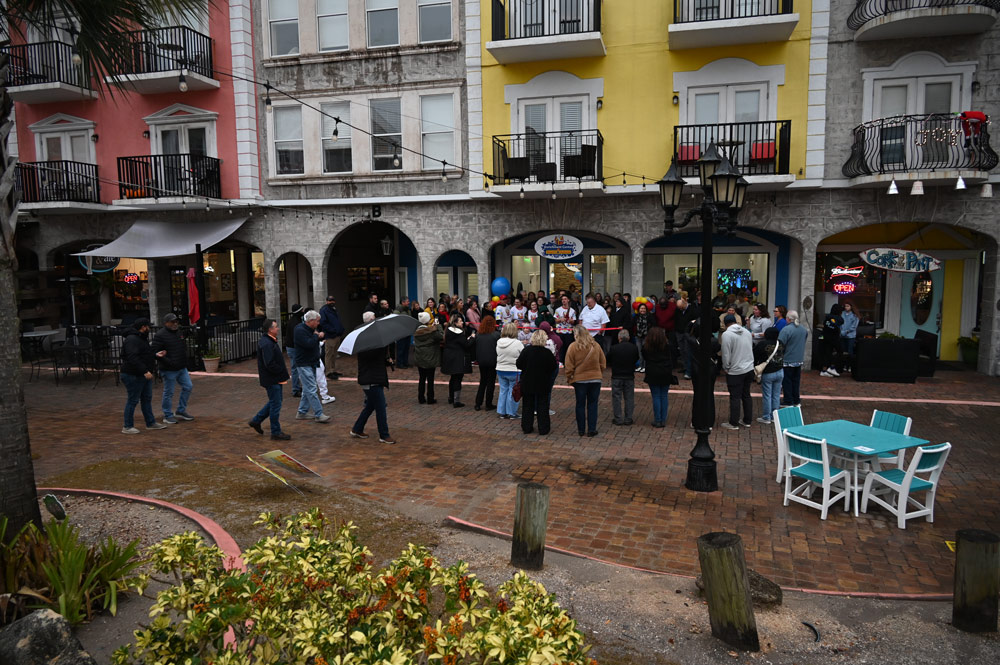
Almost 10 years ago–in 2016–Erica Flores sat down with Tim King, then director of exceptional student education in Flagler County schools, to talk about creating summer-camp opportunities for students with disabilities. Both thought it was needed. They spoke for hours. Out of that conversation at Panera emerged the concept of Vincent’s Clubhouse. Over the following years it would rent out spaces all over town to host its camps run by teams of volunteers in partnership with Flagler schools, and become a place for people with disabilities to develop work skills, preparing them for life’s challenges beyond school.
Flores and her husband Hector then developed an evidence-based program of a dozen units focused on vocational and life skills training, personal development, hygiene, financial skills, marketplace skills, and literacy.
It was not until late last year, after years of evolution and growth, that Vincent’s Clubhouse’s nomadic years ended with the opening of its permanent home, a 1,600-square-foot facility–what would otherwise be a shopfront–at European Village, with a faculty of five and 20 adult “members” enrolled. Flores prefers to refer to enrollees as “members,” reflecting an organization and a place where people feel welcome in an actual clubhouse: “People that are part of a clubhouse are members,” she says.
King has been involved in the organization all nine years. “It has been a great pleasure and joy to be connected and to see the growth of the campus, to see how it’s impacting the community, to see it as a valuable resource,” King said.
Tuesday afternoon and evening, scores of people, including Superintendent LaShakia Moore, School Board member Lauren Ramirez, County Commission Chair Andy Dance, Commissioners Greg Hansen and Pam Richardson, Palm Coast Mayor Mike Norris, City Council member Theresa Pontieri and former County Commissioner George Hanns, braved the whipping wind and icy drizzle on an otherwise grimly gray evening to mark the official grand opening of Vincent’s Clubhouse Enrichment Center with a ribbon-cutting and a toast “to Vincent’s clubhouse for all that has been and all that will be coming, and to our wonderful community,” as Flores put it. She raised her flute of sparkling (alcohol-free) cider to cheers.
Moments earlier she and her son Vincent had clasped the ceremonial scissors that, amid a throng of supporters, board members and Vincent’s own members, cut the red ribbon in front of Unit B120 at an otherwise deserted European Village. Then it was back inside the center, where elbow room was scarce and exuberance aplenty. It was “a testament,” Flores said, “to the community of Flagler County, and our commitment and following the Vincent’s Clubhouse mission of inclusion and diversity in creating quality programs for individuals with disabilities here in Flagler County.”
Palm Coast City Council member Theresa Pontieri had noted the coming ribbon-cutting at a recent council meeting, after Vincent’s Clubhouse Board Member Eddie Lang had spoken of it to the council. The city had issued a release announcing it. “I just wanted to give it visibility,” Pontieri said, describing the turnout as “a testament as to how much our community cares about one another.”
Moore, the superintendent, has known Vincent since he was 4, first as a member of the faculty at Rymfire Elementary, where she remembers his first day in kindergarten–Moore has an encyclopedic memory for students’ names, less so for adults–then as principal there. Vincent is now a sophomore at Matanzas High School. Moore remembers Flores, too, having known her just as long. “Since the first day I met her, she has been advocating not just for Vincent, but for all of our children and our students in Flagler County that have disabilities.” Vincent, Moore remembers as “extremely funny,” always a Philadelphia Eagles fan, always “a great smile on his face,” as was the case Tuesday evening as he addressed the crowd and showed his exasperation with his mother’s public endearments: “Jeee-sus,” he blurted out, head shaking, as his mother ended her toast to the crowd with “Vincent, I love you, kid, with my whole heart.”
The school district has programs such as Adults with Disabilities and Trails–Transitioning Youth with Disabilities into Real Vocational Opportunities through Action Planning and Individualized Learning, though Trails, which prepares individuals for jobs by placing them in actual work situations through participating businesses, is limited to those 18 to 22 years old. Vincent’s Clubhouse has no such limit, nor other “barriers and the restrictions that the public school system has as far as what they may or may not need to cover in a particular curriculum,” Flores says.
“There are going to be some similarities with our adults with disabilities program,” Moore said, “but for me, this isn’t a competition. It’s about being able to complete a work that we have here in our community. We always have a wait list within the school district for all of our programs, and so that just shows the need for others to come and partner along with us.”

Ask Stephen Furnari, co-owner with his wife Kristi of Ripple Co-Working in Flagler Beach and the co-founders of ESE Advocates (FEA), an advisory board for parents of students with disabilities receiving exceptional student education in Flagler County. “This is a game-changer for the community,” Furnari said. “There really aren’t a lot of services like this, a day program,” he said, recalling his conversations with Flores. “We were talking about even bigger, like a residential program,” such as those in St. Johns and Duval counties. “For me and Kristi personally, like our daughter is 16, we’re on a timeline, and what does she do after she ages out of school? So this is an option. It’s a very viable option. We’re very supportive of Erica and Vincent’s Clubhouse. We want her to just be successful here and see it grow, and we’ll do whatever we can.”
But it’s a struggle, and it’ll take a commitment from the community and from corporate sponsors and fundraisers to make the non-profit endure and grow. Members pay tuition, but it doesn’t cover all the costs, Flores said.
She has no doubt it’ll work. Her energetic enthusiasm alone would convince investors, though insists on putting substance above all. Tuesday evening may have been a ribbon-cutting, and Flores was the center of attention. But something King had said stood out even then. It was not about her. Taken aside to be asked a few questions about the Clubhouse, and despite the surrounding din and distractions, Flores was immediately in Enrichment Center mode, speaking of the operation in the detailed, distilled outlines reflecting years of thought: “One of the things that I pride myself with at Vincent’s Clubhouse is that our program is very, very member-focused and member-specific,” she said, “which comes from my healthcare background, and healthcare administration and executive leadership, where it needed to be very patient specific: Taking that same philosophy and concept to Vincent’s Clubhouse where, when our members come, what works for one is not going to work for the other. Obviously, that’s even more true with individuals on spectrum.”
With such a wide variety of people on the spectrum, the challenge is to find what drives each member, “what are their goals, what are their motivators, what are their strengths and interests, what are their dislikes, where are they comfortable,” Flores says. “Because when they’re happy and thriving and doing what they love most, obviously they’re going to be successful, just like any neurotypical individual. I think sometimes our disability community doesn’t get that focus, doesn’t get that they don’t get asked those questions. They’re like, Oh, you want a job, great. So here: let’s go work in environmental services, or let’s go work in the culinary department. There’s absolutely nothing wrong with that, if you have a passion and a desire to work in environmental services or culinary. That’s just an example.” But the more searching goal, which takes more individualized work, is “finding specific opportunities for our members that will really help them thrive and be the best version of themselves, just like a neurotypical individual.”
The programs at the Clubhouse run like school semesters, covering curriculums the same way. This summer, the Clubhouse will start offering theme-based, age-delimited camps. As Flores sees the future, it won’t stop with just that facility at European Village. She sees the concept of Vincent’s Clubhouse expanding to other communities. And what she conceives of, as she did at Panera in that long founding discussion with King, tends to have reach, as Tuesday’s event suggested.
“It just shows the commitment that individuals here in Flagler County have toward ensuring great opportunities for our students and our adults with disabilities,” Moore said. “This program really is that opportunity to bridge with what we do in the school system and provide opportunities before and after school, as well as over summers and breaks for our students, but also for our adults as they age out of what we offer within the school district.”
![]()






























JC says
It’s a starting point the location. Hopefully in the future they can move into a more appropriate location that is away from the bar next door on its right and the cigar lounge on its left.
HJ says
Luckily the center operates during business hours 9am to 2pm so the traffic from the bar next door doesn’t affect any aspect of the facility and it’s services, and the cigar place it’s across the tunnel so there is no Smoke 💨 even near the center, everyone can operate perfectly and it brings a most needed new air to the European Villages, when one wins everyone else does as well 🙏🏼.
JC says
I think on a professional level it is not the most ideal location to be near a cigar bar or a bar. But that is just me.
Thomas Oelsner says
This is awesome as these members are getting to live their dreams and create new ones as they are given new opportunities.
In 1990 my wife and I were living on Long Island and she worked for Reuters. When the copy center couldn’t keep up with the work, she reached out to the local agency that offered job training for people with disabilities. The people they sent over were amazing-of good humor, kind, and incredible workers. Yes, there were issues on occasion, but nothing that couldn’t be resolved quickly. The program was so successful my wife received recognition from Governor Mario Cuomo.
I hope this program is so successful they will grow out of the new facility.
Deborah Coffey says
This is so wonderful! Thank God for people like these. It gives hope for our country and our community.
Doug says
Good people doing good work! I hope the community will embrace and support them.
Endless dark money says
If you really want to help disabled people then change the rule that says they can only have 1620 maximum a month in their bank account or their disability benefits cease which is what they need to survive. That’s the reality in today’s fascist oligarchy formerly known as the usa.
Karma says
Yall remember when your dear leader made fun of the disabled person…..
oh how we’ve changed hahahah.
Ban those inclusive policies haha
Hey prescription drugs are up 1400% in a week thanks to the diaper dictators orders. Have no fear if there’s another pandemic 1 million deaths will look great comparatively. Silly health organizations providing health to people, not under this regime. Oh and putins puppet just ended aid for Ukraine. Good luck to those who are actually fighting oppression and the lesson is don’t trust or rely on murica as we are savages for a dollar.